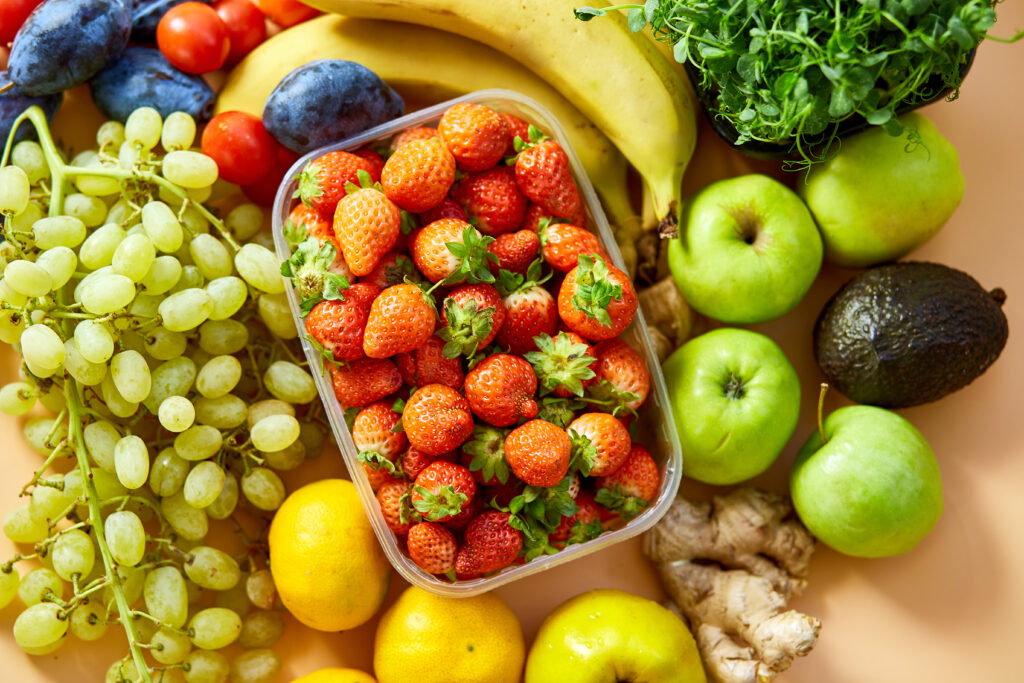In the quest for healthier eating habits, it’s crucial to consider not just what we eat, but how our food is grown. The Environmental Working Group (EWG) has once again spotlighted this issue with its 2024 Shopper’s Guide to Pesticides in Produce, revealing the foods with the most pesticides. The “Dirty Dozen” list serves as a stark reminder of the prevalence of pesticides in our produce aisles.
Foods with the Most Pesticides
In 2024, the EWG analyzed test results from 47,510 samples of 46 different nonorganic fruits and vegetables, primarily tested by the US Department of Agriculture (USDA). This comprehensive analysis revealed the presence of 254 different pesticides across the sampled produce. Notably, 209 of these pesticide types were detected on the fruits and vegetables making up the list of the top 12 foods with the most pesticides.
According to the EWG, about 95 percent of nonorganic strawberries, certain leafy greens (including spinach, kale, collard and mustard greens), grapes, peaches and pears contain detectable levels of pesticides. Here’s the produce that make the list of foods with the most pesticides:
- Strawberries
- Spinach
- Kale, collard and mustard greens
- Grapes
- Peaches
- Pears
- Nectarines
- Apples
- Bell and hot peppers
- Cherries
- Blueberries
- Green beans
This annual report highlights the persistent issue of pesticide contamination in fruits and vegetables, emphasizing the need for consumers to be aware of what they are ingesting.
Related: USDA Confirms Pesticide Residue Levels are Safe in 99 Percent of Produce
The Impact of Pesticides
The dangers of pesticide exposure cannot be overstated. Studies have linked pesticides to a range of health issues, from reproductive problems, including reduced sperm count, to serious diseases like heart disease and cancer.
Children and farmworkers are among the most vulnerable, and exposure can lead to genetic damage and impaired neurodevelopment. Yet the problem extends beyond immediate health concerns. Pesticides continue to linger on our food, even on crops where their use has been banned, pointing to systemic issues in food safety regulations.
Reducing and Avoiding Pesticides
It’s not all doom and gloom. The EWG also provides a “Clean Fifteen” list, highlighting produce with the least pesticide contamination. Avocados, sweet corn and pineapples lead this more positive note, with nearly 65 percent of these items showing no detectable pesticide residues.
The USDA and US Food and Drug Administration (FDA) test produce for pesticides. These agencies employ methods like washing, peeling and scrubbing to mimic consumer practices. However, these steps, while beneficial, are not foolproof. The EWG’s findings reveal that no washing method completely eliminates pesticides. Consumers are encouraged to clean their produce thoroughly, but this highlights the importance of addressing pesticide use at the source.
Opting for organic versions of the Dirty Dozen can significantly reduce one’s pesticide intake. Studies show a drastic drop in detectable pesticides in the body after switching to an organic diet. While organic produce is not inherently more nutritious, the reduction in pesticide exposure is a compelling benefit for many consumers.
The Debate Over Safety Standards
Critics argue that the EWG’s report unfairly targets farmers and may deter people from consuming necessary fruits and vegetables. They point out that most nonorganic produce has pesticide levels within legal limits. However, the counterargument is potent: legal does not necessarily mean safe. The presence of banned pesticides on produce sold in the US and the ongoing debates over the safety of chemicals like chlorpyrifos underline the complexities of determining safe levels of pesticide exposure.
The EWG’s 2024 Dirty Dozen list serves as a critical reminder of the foods with the most pesticides, urging consumers to make informed choices about their produce. Whether through selecting organic alternatives, thoroughly washing fruits and vegetables or advocating for stricter regulations on pesticide use, individuals have the power to reduce their pesticide exposure and push for a safer, healthier food system.
If you want your company to be featured on Xtalks.com, please email [email protected].












Join or login to leave a comment
JOIN LOGIN